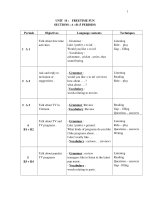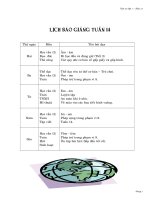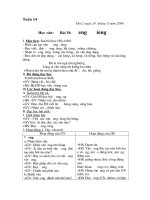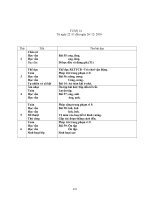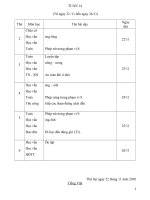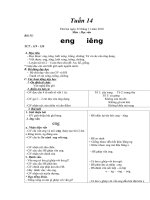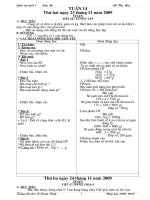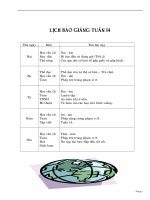GIAO AN HEADWAY 1 UNIT 14
Bạn đang xem bản rút gọn của tài liệu. Xem và tải ngay bản đầy đủ của tài liệu tại đây (133.21 KB, 5 trang )
Unit 14: HAVE YOU EVER?
I. Introduction to the unit: The theme of the unit to talk about experiences in our
life focus on Present Perfect tense with ever, never, yet and just. There is a
reading about three people who are 100 years old. This gives further exposure
to and practice in the present perfect contrasted with the past simple and also
provides a springboard for discussing life and experiences. There is also a
listening section with the song leaving on a jet plane. This links into the
Everyday English section – At the airport
II. Language aims
1.Grammar:
Present perfect : Use to express an experience some time in one’s life and use to
refer the present result of the past action with the adverbs yet and just
Notes:- We do not introduce the third main to refer to unfinished past
- Common mistakes: I have seen him last week, When have you been to the
State?
Did you ever try Chinese food?
2. Vocabulary: There is no self –standing vocabulary section in this unit , but a lot
of general vocabulary is recycled and extended through the structure input
3. Everyday English : Language useful in situations at the airport is introduced and
practiced
CONTENTS TEACHER’S & Ss’ ACTIVITIES
STARTER
Match the country and flags
Tick the countries that you have visited
IN MY LIFE
Have you ever been to Italy?
When did you go t there?
Which tenses do we use in two questions above?
Today we will learn :
PRESENT PERFECT TENSE
1. Form:
(+) S + have/has + V
3/ed
…
(-) S + have/has + not + V
3/ed
…
(?) Have/has +S + V
3/ed
…?
Yes, S + have/ has
No, S + have/ has + not
Wh + have/has + S + V
3/ed
……?
What is the present perfect used for?
2. Use: - expresses activities or situations that
occurred/ didn’t occur at some unspecified time in
the past.
-T asks Ss to look at the flags
and match the country
-Ss do the exercise
-T corrects
-T gives situation to guide Ss to
the lesson
- T gives examples
Ss give form
- Asks Ss to give the usage of
present perfect tense
- Asks Ss to gives more
examples
Eg. Tim has already eaten lunch
Ann hasn’t eaten lunch yet.
- expresses activities that were repeated
several or many times in the past. The exact times are
unspecified.
Eg. Peter has eaten at that restaurant many times.
- expresses situations that began in the past
and continue to the present, is used with since and for
Eg.I have known him since 2000 (sau since là một
mốc thời gian)
for 7 years(sau for là một
khoảng thời gian)
- to talk about experiences in our life
Eg: I have ever been to Ha Noi
Adverbs go with this tense?
- goes with just, since, for, yet, already, ever,
never, recently, so far …
Note: “yet” is used in negative and interrogative
sentences, and stand at the end of the sentence.
“just, already, never, ever:
S + have/has + just/ already/never/ever + V
3/ed
…
3. Special structures:
a. S + have/has + ever/never + V3/ed
b. S + have/has + not/never + V3/ed … before
c . S + have/has +(not) + V3/ed … for/since …
Ex1 : Read, listen and repeat the sentences
Tell each other which of the countries above you
have or haven’t been to .
Have you ever been to any of other countries?
I’ve been to Hanoi # I’ve gone to Hanoi
* Compare past simple and present perfect:
We use past simple to say exactly when something
happened
Eg: I watched TV last night
We use present perfect to talk about an actions
happened in the past & related now or recently
finished
Eg: I’ve just seen that film
We’ve finished the present perfect tense
Ex 2 : Read , listen , practice with a partner
Ex3 : have similar practice
T gives on the board and
explains
Ss listen and take note
- T gives more examples and
asks them to compare the same
and the different between them
Ss work in pairs to practice
-T turns on the tape
-Ss listen and repeat then
practice in pairs
T explains the difference and the
same between past simple and
present perfect
Ss practice in pairs
T controls
PRACTICE
Infinitive , past form and Past participle form of
some verbs
Eg: eat – ate – eaten
Fly – flew – flown
Which are the two regular verbs?
The life of Ryan
Have you ever seen Romeo & Juliet?
Have you ever stayed in a hotel?
Yes Ryan has ever done these things and more. Now
listen and tick the things he has done
Words and phrases:
Flown in a jumbo jet
Tractor(n)
Competition(n)
Famous politician(n)
Ex 2:Listen again and answer the questions:
1. Which city did he live? – in Osaka
2. Did he enjoy it? – yes , he did
3. Did he like the food? – yes he did
4. What sort of company did he work for? – A car
company
5. When did he work there?- two years ago
6. Who did he see at the airport? –a famous politician
7. What play did he see?- Romeo and Juliet
8. When did he see Romeo & Juliet?
When he was at school
9. When did he drive a tractor? When he worked on a
farm
10. When did he work on a farm?- When he was 17
11. Where was he born?- in a hospital
A HONEY MOON IN LONDON
Present perfect + yet& just
Eg: Have you seen that film yet?
We have just finished past participle
Note: -(not) yet means (not) before now
- Just means a short time before now
Where are Just and yet in a sentence?
Just is added between have and past participle
S + HAVE/HAS + JUST +V3/ED
- Asks Ss form given past
participle to write into infinitive
and past form
- T corrects and asks them to
repeat after T
-T introduces the lesson by
giving some questions
- Guides them how to do the
lesson
- Gives some new words
- turns on the tape
Ss listen and tick
- T corrects
Asks some questions
Ss listen to the tape again and
answer the questions
T gives examples and explains
by giving some question
Ss look at the examples and give
answers
Ss practice thoroughly doing
exercise
Yet is at the end of the negative & interrogative
sentence
S+ HAVE/HAS( NOT) + V3/ED+ O + YET
HAVE/HAS +S +V3/ED + O + YET?
Ex1:
Rod and Marilyn come from Christchurch,
Newzealand . They are on honey moon in London.
Before they went, they made a list of things they
wanted to do there. Read the list
Ex 2 :
Do you think they have done all the things?
To know what they have done. Let’s listen to the
conversation: Marilyn is phoning her sister Judy,
back home in Newzealand to talk about the things
they’ve done . Listen and tick
Ex3 : Practise in pairs to talk about things they
haven’t done it yet
Ex 4 : Listen again and check
PRACTICE
S1 : Have you + V3/ed + O + yet?
S2: Yes. I’ve just done it
Ex 1 : Make question with yet and answer with just
New words :
- washing up(n)
- Shopping(n) do the shopping
- Wash your hair
- Clean(v)
- Make the dinner
- Give S.th to S.O :
- Chinese food(n)
- Champagne (n)
Ex 2 : tick the correct and explain why do you
choose it ?
Reading and speaking
Who is the oldest person you know?
How old is he/she?
What do you know about Their lives?
Why do you think they have lived so long?
New words and phrases:
- pneumonia(n) : viêm phổi
- ambulance driver(n)
- engineer(n)
T guides Ss how to do the
exercise
Ss practice in pairs
T corrects
T introduces situation then
turns on the tape
Ss listen and tick
T corrects
T plays the record again and
check
T gives new words
Ss repeat after T
Ss do the Ex1 in pairs
Some pairs present before the
class
T corrects errors
Ss do the Ex2
T corrects
T gives situation to guide Ss to
the lesson
Gives New words & phrases
Ss repeat in chorus and in
individually
Teacher reads the text about
Joyce Bews,Tommy Harrison,
Alice Patterson- Smythe,
students listen. Students read the
- heart attack (n)
- lung cancer(n)
- rheumatic fever (n) : chứng thấp khớp
- secretary(n)
- grandson(n)
LISTENING
Leaving on a jet plane
Have you ever gone by plane?
How did you feel?
Words:
- park(v)
- Wake S.O up(v)
- dawn(n)
- morn(n)
- horn(n)
ENGLISH EVERYDAY
At the airport
Have you ever gone by plane?
What do you have to do at the airport?
Now put the sentences in the order
Ex1 Read the sentences and put them in the correct
order
Ex2 Listen to the airport announcements and
complete the chart
Ex3 Complete the conversations with the correct
question
Ex 4 Listen and check
text aloud( each student reads a
paragraph.). Students read the
text silently then do the
comprehension check.
Ss work in groups , find
information to answer the
questions
T corrects
Asks Ss to look at the picture
And answer the question
Gives new words
- Asks S s to guess & complete
the missing words
Turns on the tape
Ss listen and check the lesson
T corrects
Ss read the sentences and then
put them in the order , working
in pairs
Check the answer with the
whole class
Turn on the tape 3 times
Ss complete the chart. T corrects
Ss do it by themselves
T corrects
